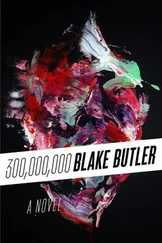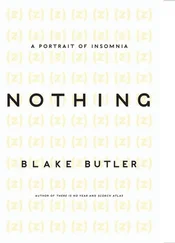
The shrieking sound came through the ceiling. Person 1180 felt her skin go limp. Fat powder fell around her on the blond wood — powder of bodies, burst into the air from somewhere else, their hair and syllables all knitted up in the meat of what she inhaled, and in the linings of her thinking. Beyond the house, she heard the fry of insect legs in time, long needles wanting at her flesh. All the light was full of perforation.
Person 1180 had the child spread on the table. His newborn eyes sometimes changed color. They would be dark green like the father’s, then next blink they matched the wall. Sometimes the whites went checkerboard or spiraled — sometimes the pupils were not there. Person 2030 had come out twenty pounds. Person 1180 had a limp she blamed on jogging and a scar she blamed on God.
The shrieking warbled at the window. The glass bent but did not break. The child began to leak black liquid as his ass raised off the table.
The tone had been appearing on the air for weeks. Its tone contained all possible timbre: every sentence ever crammed into each blink. Sometimes the tone would last for several hours, sealing the air against all other motion. It always hurt. It made Person 1180’s blood go numb. It made the books fall off the bookshelves and land opened to certain pages, though when she tried to look the words would melt or disappear. No one could say what made the tone or where it came from. Tax dollars were purportedly at work.
In the yard the trees were shaking. Dirt had filled in over our glow.
The tone peeled at the nursery walls. In strips the paint flapped at 1180’s head. She felt her kneecaps swelling, weighing her downward. She felt another presence in her, like the child, though longer than it, thicker than it. She touched the shaking boy there on the lacquer. Their skins became at once adhered between them. The mother could not get her hand back. The skins were smoking. The child’s spine showed through his chest. 1180 yanked and yanked.
Was the child laughing at the mother?
In the pockets between shrieking, Person 1180 read aloud. She read the book she’d found wedged among the folds of the long curtain in the hall just after Person 811 left, a date whose definition she could no longer remember, nor did she know why they’d chose to hang the curtain there — the only thing it hid was flat white wall, marred with no windows. The book was the same size of the book that you hold now. The front page had an inscription handwritten to Person 1180 by someone with an illegible signature, in bright blue ink that stung her eyes:
READ THE CHILD THIS BOOK OR HE WILL SUFFER
The text on all the other pages had been printed in a code, or in a strange language she did not recognize — babbly syllables and glyph fonts, planar symbols and number reams — and yet when 1180 passed her eyes over the lines and let her voice go, she felt the syntax easing out. Her reading voice was low and burnt and came up from her linings, something old and rhythmic as it passed. Doing the speaking in this manner juggled color in her lungs and made her woozy, a kind of crystal glass around her face. Whole hours or even days might pass before she noticed she’d been suspended in that method for so long, often even in reading a single line. She did not like this feeling but could not seem to stop it. She’d thrown the book into the flood yards behind the house more times than she could count — she’d buried it, burnt it, sold it, ate it, locked it in a metal cube — and each time the book had appeared again clenched in her arms while she was sleeping. At night the night was loud and seized with lice and there was nothing else to be. Often the lingering feeling of what she’d last read made her want to take actions unimagined, things she knew she did not really want to do and never should, and so for the most part she did not do them, though some nights it was so cold.
After each page, before turning, Person 1180 would lift and hold the book up at the child so he could see it and together they would stare. The text contained no pictures beyond the way the paragraphs all seemed to congregate and blur among each other, rising colors. The child would coo and gosh and try to touch the paper. When she’d not allow him, he would shriek — a splattering mess of voice so loud it traced her brain. And yet she read, and the more she read the more he wanted, and the silence in her ribs. She could feel the hours passing between them in those moments, slapped like batter, and she could not blink or turn away until allowed.
Around the house outside the men arrived. There were very many men.
The men were nude, their thumbs were missing; they had lesions on their eyes. In the lesions were further lesions uncountably compiled, and the chalky mouth-washed blood that ran between them thrumming at the seams of where they were, soldered into cricking plastic tubes around their bodies — from when, years back, the city had mandated all one blood among ex-felons —these men must share and wear their plasma. Within the rancid blood, the grit amassed: grit of terror and of sad breath, swell and recession, an aging blackness in their pits — of the sky’s continued creasing, of hyper-need — grit of want of spaces between buildings being filled — our silent scrying old forever.
Some of the men had cysts grown on their backs or forehead larger than the men themselves. Some had paid to have these cysts removed while others shanked them off with lengths of wire or by lying down in streets where starving dogs would chew straight through the gristle, wetting earth up with their blood. The men’s newest wounds were open and incandescent and in spots spotty with attempted healing — skin that could not quite find the width to fit together, and so in the light would spit and blush.
These men were alive and always had been and always would. Once they’d had made a workforce, an army, navy. They’d bought and sold on an open market such fine goods, and each alone they’d managed small houses of their own, and wives and sons and celebrations, occasional ideas. They were men as well as women. They wanted out of where they’d been and into something they could hold. They surrounded every home, and where every home now stood no longer, a long low cold held on the world.
The men could smell the mother — her liquid, gallons, warm wet she’d hid inside her all those nights — they could feel her flesh meet on their teeth. Person 1180 had sewn herself shut once for several drier days, but the men had fixed that.
The men had hair grown in their eyes — hair the same color all over their bodies and in their stomachs, in their brains — hair that before them had lined their fathers and those men’s fathers. Many of the men as well had tattoos of every word they still could think, which obscured certain portions of the men’s bodies into patches of craggy, mottled ink.
The men came into Person 1180’s home. They slit the windows with their tongues and knives of screaming. They pried up the vinyl siding where wreaths of spore had lodged for blossom and they wormed their way between the blue. Certain men slid their fingernails into the locks, shaped for this instant. There were so many ways of entrance and only one clear way back out.
In the front room of the house there was a picture of the house.
Through the front door window in the photo you could see the same photo behind the glass, and if you looked very close you might see the photo lodged in that photo, and in that one, though beyond that who could say what for what or why.
It was a very, very old house, and an even older picture.
Читать дальше













